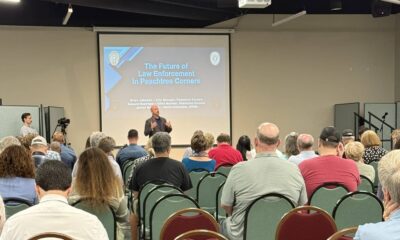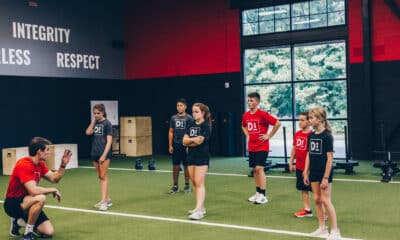Business
Capitalist Sage: Life-changing Leadership with Betsy Corley Pickren
Published
6 years agoon
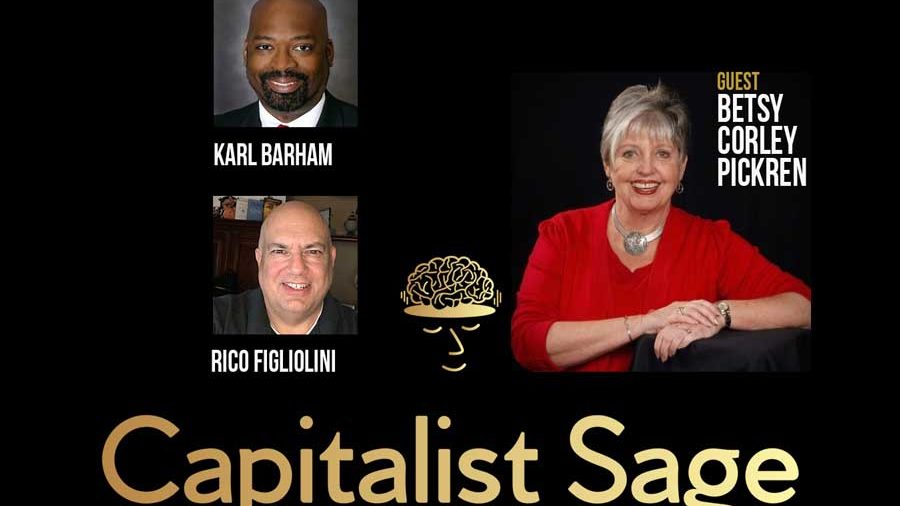
In this episode of Capitalist Sage, Karl and Rico sit down with Betsy Corley Pickren, an executive leadership coach. They talk about the importance of investing in leadership, no matter the size or shape of the business, and how to develop structures that promote leadership development in all employees in the business. Betsy shares that developing leadership skills can come in many different forms, whether through one on one coaching, meeting with a group of like-minded entrepreneurs, or finding someone to hold you accountable.
Resources mentioned
Leadership in Turbulent Times, Doris Kearns Goodwin
Think and Grow Rich, Napoleon Hill
Kennesaw State University, Executive Education
Betsy Corley Pickren
Phone: 770-263-7736
Email: betsy@betsypickren.com.
Website: www.betsypickren.com
Christ Church Players
Phone: 770-447-1166
Website: www.ccnorcross.org
Transcript of the podcast:
Karl [00:00 ]: Welcome to the Capitalist Sage Podcast. We’re here to bring you advice and tips from seasoned pros and experts to help you improve your business. I’m Karl Barham with Transworld Business Advisors, and my cohost is Rico Figliolini with Mighty Rockets Digital Marketing and the publisher of the Peachtree Corners Magazine. Hey Rico!
Rico [00:17 ]: Hey Karl.
Karl [00:18 ]: How you doing today?
Rico [00:19 ]: Good. It’s been a great day so far.
Karl [00:20 ]: Oh, fabulous. I know we’ve got a lot of exciting stuff to talk about today, but why don’t we start with our sponsors for today’s podcast?
Rico [00:28 ]: Sure. Our biggest sponsor – our new sponsor actually – is GMC primary care Specialty Centers. They just opened a few weeks ago. They’re an offshoot of Guinnett Medical Center, and it’s a great facility. I toured the facility along with a bunch of other people during their grand opening. Let me tell you, they have imaging center right there and can do all sorts of new things that you normally would have to send out to other facilities for. And it’s brand new. And it used to be the – for those of you who know Peachtree Corners – it used to be the old Apolitos restaurant. You would never know. Absolutely gutted out – it’s beautiful.
Karl [01:04 ]: Right at the intersection of 141 and Peachtree Corners Circle.
Rico [01:09 ]: Just at the QT store. Almost next door to let’s say – Planet Smoothie. Where I go get my smoothie.
Karl [01:19 ]: Oh, fabulous. I’m glad to have them here. How about some of our other sponsors?
Rico [01:23 ]: Sure. So Prototype Prime, which is now under Curiosity Lab Peachtree Corners. It’s a sponsor to a lot of podcasts there. And they’re going to be – well, Curiosity Lab in Peachtree Corners is a big thing right now because of autonomous vehicles, the 1.7 mile track that we have and the local stuff that we do in there. And they’re gonna be an off-site demo. A demo off-site from the Smart City Atlanta Expo that’s happening in the city of Atlanta. And this is an offshoot – the first North American expo of the sort. It’s based out of Barcelona, and it’s gonna be a neat thing. It’s going to be anything you think that with Smart City, and bring it to people.
Karl [02:04 ]: Internet of things, how they use data, help enhance quality of life, how cities are becoming smarter. It’s gonna be a showcase of all those companies and technologies.
Rico [02:17 ]: Absolutely. And that’s happening September 11, 12 and 13th. You can find out more by going to our website at LivinginPeachtreeCorners.com. You’ll see a place where you can go right to that and get information and buy tickets to it if you want. So they’re one sponsor. Atlanta Tech Park – we’re doing our podcast here. So this is a great facility – they let us do this twice a month, and along with other things. And well those are the three main – we are Peachtree Corners Magazine and media sponsor for the Smart City Expo Atlanta, so.
Karl [02:48 ]: Oh, fabulous, fabulous. Well, lots of things going on, but today I want to talk to our guest – Betsy Corley Pickren, who is the president and leader of Woodfire Leadership. And she specializes in help developing and training leaders. Offering executive coaching services, training, but today, we want to talk a little about how it impacts investing in leadership can impact small business owners in the business community here in Peachtree Corners and beyond. So first, I want to maybe start this – Betsy can you introduce yourself?
Betsy [03:26 ]: Hi! I am Betsy Corley Pickren as you said, and I have had my own business for, hmm, twenty years? A good long time. And I really have a passion about leadership because leadership – leaders have so much impact on people who are around them. And they can make people’s lives hell or heaven. And so, I’d like to have a little more heaven.
Karl [03:57 ]: Oh, that’s fabulous. So I’m curious, what got you interested in focusing on this and building a business around creating and building leaders?
Betsy [04:06 ]: That’s a really good question. I – I’ll talk more about my dad later, but he – I saw him as a leader. And I kind of always got put into leadership positions, whether I wanted to or not. And then I was lucky enough to begin working with a company that really set the bar on leadership development. And just fell in love. So –
Karl [04:40 ]: Wow, fabulous. So when you see folks – I know that I talk to a lot of business leaders. And when they’re talking about their business, I’m surprised in all the things they invest in. They’ll spend in marketing, they’ll spend in inventory, they’ll spend in technology. But when I ask them how much they spend in investing in themselves and the leaders in the company, you wouldn’t be surprised to hear that they don’t spend as much time and money resources in that. Why do you think that is, and what are some of the things that can help be better business leaders if they were to make those investments?
Betsy [05:16 ]: Why, what a great question. Why don’t they? So, Dee Hock, who was the leader of Visa for a number of years, said that leaders need to spend at least 40% of their time on themselves. And I think maybe not enough leaders have read that or heard that. And sometimes, leaders are there to – because of the power. And that’s not what it’s about. I mean I really believe that leaders exist to magnify their own strengths, the strengths of those around them, and the strengths of the enterprise they serve for a common goal. And so, it’s – there’s a why. There’s a why behind why you’re a leader. And we were talking earlier about Simon Sinek. And he wrote the book, “Start with Why”, and I actually want to read a quote from him. He says, “Imagine a world when the vast majority of us wake up inspired, feel safe at work, and return home fulfilled at the end of the day, feeling as though we are contributing towards something greater than ourselves.” How does that sound?
Rico [06:37 ]: That sounds great to me.
Betsy [06:39 ]: Me too, me too.
Rico [06:41 ]: You want to feel like you’re contributing to society, to family, to a common good.
Betsy [06:49 ]: Yea. Not just a cog in the wheel that nobody pays attention to.
Karl [06:53 ]: When you think about organization businesses in general, how many times have you gone to a place of service – it could be a restaurant, it could be anything. And the folks there don’t feel like they’re terribly engaged. And they seem like they just got in there, they’re forced there. But then you counter that when you go somewhere with a great experience. They’re excited to see you. They welcome you. They’re asking you. They’re engaged. It makes a huge difference where you choose to spend your money and time and invest in business. But how is that culture created? What role does a leader have in creating that culture?
Betsy [07:26 ]: Well, the leader really – being a leader isn’t about charisma. Being a leader is about having values that you know about yourself, having a vision. Not only what you want to do, but how you want to go about it. What are your values, and what do you want other people to do in terms of those values. I worked for a company, and this was a training and development company that got me super hooked on leadership, and we had some great salespeople, we had some great, you know, production people, and they would get called out as much for their behavior toward other people as anybody else would for, say, not performing up to standard. And so – the leader just needs to have those things. A vision, a personal leadership philosophy that keeps them focused and moving in the right direction. And it’s about – a leader is somebody that somebody chooses to follow. And if people don’t choose to follow you, then you can call yourself a leader all day long – you’re not one.
Karl [08:48 ]: It’s interesting if you think about how you peel that back – I know a lot of big companies spend time investing in leadership for their management. But I think of a small company – and there’s maybe 12 employees. There’s a shift manager and and a couple of other folks in there. They bring in people and they don’t have those kind of resources to maybe invest in like a big company. What are specific things can a local business owner do with his crew of ten people to help them develop leadership there as well?
Betsy [09:25]: What can – well, we’ll just go back for a minute. I said I wanted to talk about my dad a little bit more. And he owned a tractor dealership, and he was great. I mean – that’s where I thought – I learned I thought sales and service was one word. Because it was corely sales and service. And he was great at that. My mother was the bookkeeper or CFO, so to speak. Well, you’ve got to know what people are good at doing. And bring out those strengths. If my father had been the bookkeeper, the business might have lasted for forty days instead of forty years. Because one time, I know he traded some tractor parts for a dog for me. And how you put that on the spreadsheet – I don’t know. So the first thing is to know the talents that you’ve got. And then, also, there are a lot of other small business people out there who can fill in so you’ve got contract CFOs, you’ve got leadership development people like me, coaches like me, you’ve got just a number of other people who can be kind of extended family that you bring in to make sure that everything you do has got a really good person doing it.
Karl [10:53 ]: So I wanted to pinpoint on – you’ve already said to Rico, like, are leaders born? Or are they made? I’m curious where you stand on that, and for folks – somebody that thinks, you know what I’m not a leader, I can’t be a leader, or I’m not a leader. What would you say to folks who feel they don’t have that talent?
Betsy [11:14 ]: Hmm. Well, I happen to believe that leadership happens at every level. If you’re a dad, if you’re a mom, if you’re a janitor, if you’re anybody can be an example to other people. And that is what one of the aspects of leadership. So, everybody is a leader in some way, shape or form. And some of us are probably born with more of a wish to lead. But just look at all the situations where people who’ve never wanted to have leadership, and a crisis happens, and they are right up there. And everybody’s following them.
Rico [12:00 ]: That’s funny. I’m reading “Leadership in the Time of Turbulence”. Great book, good presidents. Started with Teddy, Lincoln – Teddy Roosevelt, FDR and Johnson. All of them, different points of their lives they were not leaders. But there were parts of their lives when they had to become leaders. Obviously, those four presidents had challenges – from the Civil War to World War 2, and the struggles during the 60s, right? But I think you’re right in a way that everyone has a certain amount of leadership. It just depends where they apply it. And what they can apply it to. And I think the biggest thing is also persistence.
Betsy [12:42 ]: It is. We can all do – certainly have to have certain physical attributes, you have to have certain mental attributes. But if we really want to do something, we can. And yet it’s so much better if we do what we are kind of wired to do. And that’s one of the things that I tell my clients. It’s – I look for leaders who aspire to be good, great leaders as part of their career. That it’s not leadership just to move up, it’s not leadership for power, it can be leadership for influence. But it’s about, “I want to create other leaders. I want to really make a difference.”
Karl [13:33 ]: I always found people have these amazing different talents. It could be a sport, some people are sprinters, some people can run and they can go so fast. Through training, through coaching, through feedback and through practice, they can maximize. You and I will never be Michael Phelps, but imagine someone with his talents and dedication applying that over year over year. Remember they talked about the 10,000 hours of Malcolm Gladwell in practice. Are there things people can do to maximize their leadership? If you were to break it down to a few simple things that they could focus on to practice leadership? Any advice on where they can start?
Betsy [14:18 ]: Well, it all starts with awareness. There’s no way to change anything without awareness. And there are lots of ways to get there. You can ask people for feedback, you can take assessments – I have assessments out the wazoo that I help connect people with. And the – there’s a behavior shift model. And once you have the awareness, then it’s about deciding – okay. I want to do something about that. I want to get better at these things I’m really good at. And I want to get either better at the things I’m not so good at, or find somebody else to do them for me. And so I began to focus myself. And then, it is about repetition and – in coaching we call them structures. And I was coaching somebody yesterday, and he’s going to put something on his calendar every time he has a meeting to remind himself how he wants to be – be seen. How he wants to be in that meeting. And so, it really helps to have a coach, I have to say. Because you’ve got somebody to walk along with you. And I see myself as a coach as, like, a GPS. So Karl – you might say, you know, I want to go to New York. I say, okay, set me to New York, but on the way, you look over at Charleston and say, that’s kind of interesting. So we stop. But my job is to remind you that you want to go to New York. You can change your destination at any time. But that – it’s knowing where you’re going, being aware, making a choice, practicing getting feedback. It’s just like riding a bike, I guess.
Rico [16:19 ]: Yeah, it’s funny. You can have leadership, but if you don’t have goals, then what’s the point? So you’re setting the goals, you’re focused on the goal, and you need to get there. And you’re helping them keep on the track, not hitting the guardrails and not getting off that road.
Betsy [16:37 ]: Yeah, unless we stop and smell the roses along the way.
Rico [16:42 ]: And that’s always good anyway because you want to reenergize, right?
Betsy [16:45 ]: I know. Exactly.
Karl [16:47 ]: I remember years ago, I knew some folks that went to West Point, and West Point – some of the military academies pride themselves on developing leadership. But he described the model of how they develop leaders there. So, I don’t know if you’ve heard it before, but freshmen come in, and they’ve got a name for them, plebs or something. But they’re fully 100% dependent. they don’t know what to do, they don’t know how to put on their clothes, they don’t know how to make their beds, they don’t know what to do. And their job is to learn how to follow and listen to the older students so that, that listening – they have to perfect or master following before they can move up the leadership ladder. The second they become sophomores, they’re now independent. So they’re not – they don’t need to be told what to do for anything, but they need to become self-sufficient and learn how to lead themselves, develop themselves. When they get to their junior year, they emphasize leading. The juniors have to teach the freshmen how to do the structures. So now they’re getting their first taste of leading others and directing others and teach. And guess what happens in their senior year? What do you think happens in their senior year? Now they’re looking broader vision – they’re setting the direction, the strategy, the vision. They’re sort of – I said, they’re doing this in high schools, and then colleges, to help develop in a structured way. So when you said that part about structure somewhat, it’s interesting how folks like military academies – the military – have built this kind of structure. But I see folks can apply that into a small business. Someone starts in that first six months, they’re plebs. You teach them how to do everything, you teach them how to run the register, how to make every dish, how to do every – all the basic tasks. You help them learn how to learn from others. Maybe the next 6 months, the next year, they’re independent. And you’re getting a lot of value. Now they’re trained. That’s that part where you’re – I don’t want to train somebody. Now they’re actually productive. But then, giving them a path where you invest in them, you get them into training, you get them into other things so they can learn how to lead the next new person. And when they get far enough, they might be general manager – and for the business owner, this could be the hardest part. They could be part of that kitchen cabinet and circle that helps you figure out how to beat the competition, how to expand, how to make the business even more valuable if they build that structure in. But you don’t need 100 people to do that. You could do that with 10 people, the same type of structure.
Betsy [19:19 ]: Yeah, and what happens often is that, later, when they get to become a senior – and there’s something called 4 stages of contribution that follows that. But what happens often in the business world is, when a person gets to that third and fourth rung on that ladder, they get uncomfortable because they don’t know how to do that. Like, they know how to set the table and bus the table. They know how to do that and they’re comfortable. So they go back and work in the business, not on the business, and then wonder what happened to their business.
Rico [19:59 ]: And that’s where a coach probably comes in. Be able to analyze what they’re doing and really talk – is a life coach and business coach the same?
Betsy [20:07 ]: Uh, yeah. I’m a – I – when I started out, I called myself a life and leadership coach. And I think that’s probably still what I am, although it sounds better to say I’m an executive leadership coach. You know, it sounds – but – everything somebody does is about their life. You can’t say, okay so now you’re going to be a business person, and now you’re gonna be a regular person. I mean, you’re all the same person.
Rico [20:39 ]: It’s in the same philosophy of how you treat your family – your friends. It’s supposed to be almost the same way you treat your business.
Betsy [20:46 ]: I believe in congruity and authenticity. There are people who say, “Well I’m not like that at home.” And I think, “Well? Hmm. So who are you as a human being?” You know? So I think – certainly, our behaviors are somewhat different. I mean, I get that. But our philosophy of life and leadership and who we are – it’s a lifelong learning thing. But I don’t know how to split.
Rico [21:19 ]: Yeah, I can’t see how you can divorce them from each other. I mean, if you feel someone’s authentic and you trust what they’re doing in the company, you gain their respect. And that owner, that boss needs to discipline for some reason, that’s also a form of respect, right? Yeah. I don’t see how you can divorce the two. I mean, you have to be able to be who you are, and people will follow that. No one wants to follow a leader where they know, “He’s not doing the same thing. Or why is she probably doing – “
Karl [21:50 ]: Yeah. People can detect that immediately. It’s not consistent. And they see it as being fake and then you lose – you lose that. So, you know, when you – when we talk to business leaders and saw them and say, they made the decision they want to become better leaders. What are some of the things they can do to get started on that journey?
Betsy [22:10 ]: Hire a coach. You can always read a book, but knowledge is only awareness. There are some people who can say – okay, now I’m gonna work. They have that much will and, you know, self-control and all that. I’m not one of those people. I mean, I have a coach. And have for many years. And I was part of – you may have heard – Vistage. I was part of that for a while, where I’m with other people who are helping keep me on track. So I’m no different from anybody else.
Karl [22:47 ]: I – you know, I’ve established relationships that go back 30 plus years. People that will call and check in if I’m making important decisions in my career. So I’ll get feedback and learning and even there’s some that we’ll get together in a group and talk through different leadership. But also I think – just going out there. There are classes you can take and things you can go to that have – tell me a little about Mastermind Groups and what role they can serve business leaders.
Betsy [23:24 ]: Sure. Could I just comment on what you said first? That – yes. Training – I teach at Kennesaw State, I teach coaching skills for leaders, which by the way is a critical – a key piece for leaders now. Now I forgot what I was going to say. Okay. That’s not a good thing. Oh I know why – cause this is how you and I met, really. If you’re going to do some sort of training, make sure that you have some sort of follow-up. You have groups of people who get together after the training and talk about what we’ve done and hold each other accountable, because otherwise, it’s just like reading a book. You’re going to finish it, you’re going to close it, and it’s – so, make sure, if you’re learning, that you build in application for that learning in some sort of way. So I’m sorry – I got you off track. What was your other?
Karl [24:31 ]: No, no no. That’s absolutely key. If folks take classes in leadership and think they can go for two days and they walk out and go, it’s not gonna stick. I think, just like the athletes do, it’s about the practice. It’s about the application. And I always think of the coach for the lead athlete – there’s no way to lead an athlete without a coach. Mike Tyson had a coach, Mohammad Ali had a coach – they were great at what they were doing, but someone had to provide them with feedback. “Hey, you know what, you said you wanted to do this, or your time was six minutes, and so I’m giving you that feedback because you wanted to get the five and a half minutes.” And we drill and we train and we adapt and we learn as part of that collective. But I know people who say, “I don’t have time for that.”
Rico [25:21 ]: Accountability, right? So I know a lot of people who say they want to exercise, they want to do a mile run, they want to do their thing, but some of them, if they can afford to, really it’s not that expensive, you get a personal trainer who will show up three days a week. You know they’re coming at 8 o’clock. You know you have to get up and go do that.
Karl [25:41 ]: I fully endorse. That accountability and what those folks will do for people. But we started talking about – business owners is a lonely world. They’re at the top of their business, and they’re leading their business and often it can be really lonely. How do they get that level of accountability? They’re a leader.
Betsy [26:03 ]: Well, you mentioned earlier Masterminds, before I got you to backtrack. Group coaching, or mastermind groups, are fabulous. I mean, Henry Ford was in one, Think and Grow Rich, the follow that Napoleon Hill wrote about. Those – he interviewed these mega-billionaires, and they just did it on their own. They got to know each other, they would meet on a Saturday, and they would talk about their goals, and they would get advice from each other. And they kind of became their own personal board of directors. And so when you have a mastermind or group, they’re people with similar in some ways, but not competitors, and they are invested in each other’s success as much as they are in their own success. And they learn from each other. And they give to each other. It’s a give and take. Gotta be able to accept from others, positive feedback.
Rico [27:23 ]: Opportunities for improvement.
Betsy [27:28 ]: Opportunities for development feedback. And ideas. You don’t need to do the ideas, you do need to listen to them. And I just think that, the other thing that that does for a small business owner is, it makes them take the time. I don’t think small business owners have the time not to do something like that. I mean, I look at myself – I can get very distracted by this, that and the other. And if I didn’t have somebody to say, “Well I thought you wanted to focus on this.” Then, I – you know, there’s so much in life to be excited about and interested in. But if w’ere gonna go someplace, we have to kind of, go there. And so, I love that kind of idea.
Karl [28:21 ]: That’s fabulous. To create that environment here where folks can come together and do that. I know next week, I’m heading out to Charlotte for a day to meet with the mastermind group for us. There are other people who do the same thing that I do from the Southeast, and we all meet together and talk about things that are common and we’ll learn from each other. And we do that about once a quarter to get together and figure out ways to serve our clients better, how to become better, challenge ourselves. But we have people that are walking the walk that we’re walking in different ways. The best people to keep you accountable are folks that really know what you’re doing every day and can relate that.
Betsy [29:03 ]: That’s like the coaching circle that I’m a part of. We coach each other so that we always have a coach. And we rotate. And then we bring in other coaches. I’ve been a coach for almost 20 years. So I can say, you know, I’m really good. Well – yes and it’s easy to slip. And it’s easy to get stale. So we get feedback from other coaches on our coaching. And I think that really helps keep me at the top of our game.
Karl [29:40 ]: That’s fabulous. Well, I’ll tell you – when it comes to leadership, it’s always something we can talk to – talk about forever because it’s an important topic, and we definitely want to continue this dialogue. But, I wanted to at least ask, what do you have going on? What do you have going on in the next weeks and months that might be of interest to folks?
Betsy [30:03 ]: Okay. Well in addition to managing my one on one executive coaching business with larger companies, I’m also teaching a course in applied managerial coaching at – through Kennesaw State University Executive Education. And you can go online there and find out about it. And I believe this one’s going to be held in Sandy Springs. You don’t have to go all the way to Kennesaw for that. So that’s one thing. I’m really – we were talking about Masterminds, and I’m really excited about two that I’m starting this fall. One is for brand new, baby business owners. And to start out right. And to really be able to get the excitement about the business but also the direction with another group of people. And then also one for people who’ve been in business a little bit longer and maybe have more employees. And so that will start in this fall. It’s six months, at the end of that we’ll decide if we want to keep going or what we want to do with it. And in addition to that, they all get this wonderful back room kind of information about marketing and all the stuff that you have to do to keep your business moving and growing. And it’s fabulous. So that’s just and added attraction.
Karl [31:43 ]: So that’s starting out this fall?
Betsy [31:45 ]: It is.
Rico [31:47 ]: Did you want to give a link to a website? We’ll put this in the notes – in the podcast show notes. But if you want to – I think if you go on LinkedIn and search for Betsy Corvey, we’ll find you. Is there another website – somewhere else, or a phone number we can reach you at?
Betsy [32:05 ]: My office number is 770-263-7736. And my email is betsy@betsypickren.com. Keep it as simple as possible.
Karl [32:20 ]: Excellent. And is there another – you’ve got one of those for baby entrepreneurs. Do you have another group that’s forming as well?
Betsy [32:29 ]: Yeah. One is for new business owners and one is for people who’ve been in business for longer.
Karl [32:34 ]: Perfect, perfect, perfect.
Betsy [32:36 ]: I do have one other thing. Do we have time? This is just personal. So I dabble in acting a little bit, and I’ll be playing Ms. Murble on the radio show called “On the Air” by Christ Church Players. This Saturday at 7 pm – that’s August 24th. And it’s a hoot.
Karl [32:59 ]: Oh, fabulous. Where is the church located?
Betsy [33:01 ]: It’s on 400 Holcomb Bridge Rd. in Norcross. And you may still be able to buy tickets for $10 a piece by calling the office, Beth Holland, at 770-447-1166.
Karl [33:20 ]: Fabulous.
Betsy [33:21 ]: Or ordering from the website, which is www.CCNorcross.org. And we have such a good time putting this on, and you’ll see the Andrew sisters, and you’ll see – you’ll see the ladies from the Beauty Barn.
Karl [33:39 ]: Fabulous. Well it’s something to do for this weekend for folks that want to check out a cool play and community theatre and small theater here locally. I want to thank you very much for being a guest today and sharing some of your insights about leadership. I know it’s something that I emphasize to business owners to – not to focus on the marketing and so on. But when I go in there and I get a sense of the culture, when they talk about the value of a business, for instance – that matters. We want to buy well trained leaders, they retain people, they help with retention and so on. And that’s really important for folks to focus on. I want to thank Atlanta Tech Park for hosting the Capitalist Sage podcast. It’s a great place to check out here in Peachtree Corners. Atlanta Tech Park – if you’re starting a business, this environment allows you to access other people. So if you want to get feedback, it brings together a lot of different business leaders, so just in the hallways you’ll bump into other people. And that’s fabulous. So, Rico, what about you? Any other events coming up?
Rico [34:50 ]: Well, we’re going to a fundraiser tonight for the Peachtree Business Corners Association. They’re doing the Castaway, raising money for three different –
Karl [34:58 ]: At Prototype Prime, which is just down the road here. That’s tonight. 5:30 tonight.
Rico [35:04 ]: I’ve been doing silent auction. People keep trying to beat me out there on top of these five projects. But I’ve been doing a bit of that right now, just trying to help out a good cause I think. Because they’re raising money for Duke and for Norcross Proper ministries, and –
Karl [35:27 ]: That’s right, those three.
Rico [35:30 ]: You know, if you want to reach out to me for what I do sometimes, we have creative services for a group of newspapers and publisher of Peachtree Corners Magazine. I do social media marketing content, videography – just finished some product videos recently, working on website graphics now for a management firm. So you can visit MightyRockets.com or find Rico Figliolini, if you can spell that out, on LinkedIn and just let me know that you’ve heard this and I’ll accept a connection. Because otherwise –
Karl [36:05 ]: Fabulous. And I’m Karl Barham with Transworld Business Advisors. We help consult with business owners, and we’re just trying to help maximize the value of their business, become better business leaders out there, and when they’re ready to do something else, we can help them with that too. So, I can be reached at KBarham@tworld.com. Or you can go to www.tworld.com/atlantapeachtree. If you want to become a business owner or business leader, lots of opportunities available to you there. Give us a call, and we’d be glad to help you out with that. But thank you very much, Betsy, for joining us today.
Betsy [36:40 ]: And thank you for having me. I really enjoyed it. It was a very stimulating conversation.
Karl [36:44 ]: Fabulous. We’ve got more coming up in the weeks to come, so stay tuned to the Capitalist Sage.
Rico [36:50 ]: And find more stuff on LivinginPeachtreeCorners.com
Karl [36:54 ]: And we’d like to thank our director, Kinsey.
Rico [36:59 ]: Kinsey Figliolini.
Karl [37:02 ]: For doing a fabulous job in helping us with podcast every week. Thank you. Alright, thank you everyone, and have a great day.
Related
Business
Peachtree Corners Grows Business Opportunities Through Economic Development
Published
1 week agoon
May 6, 2025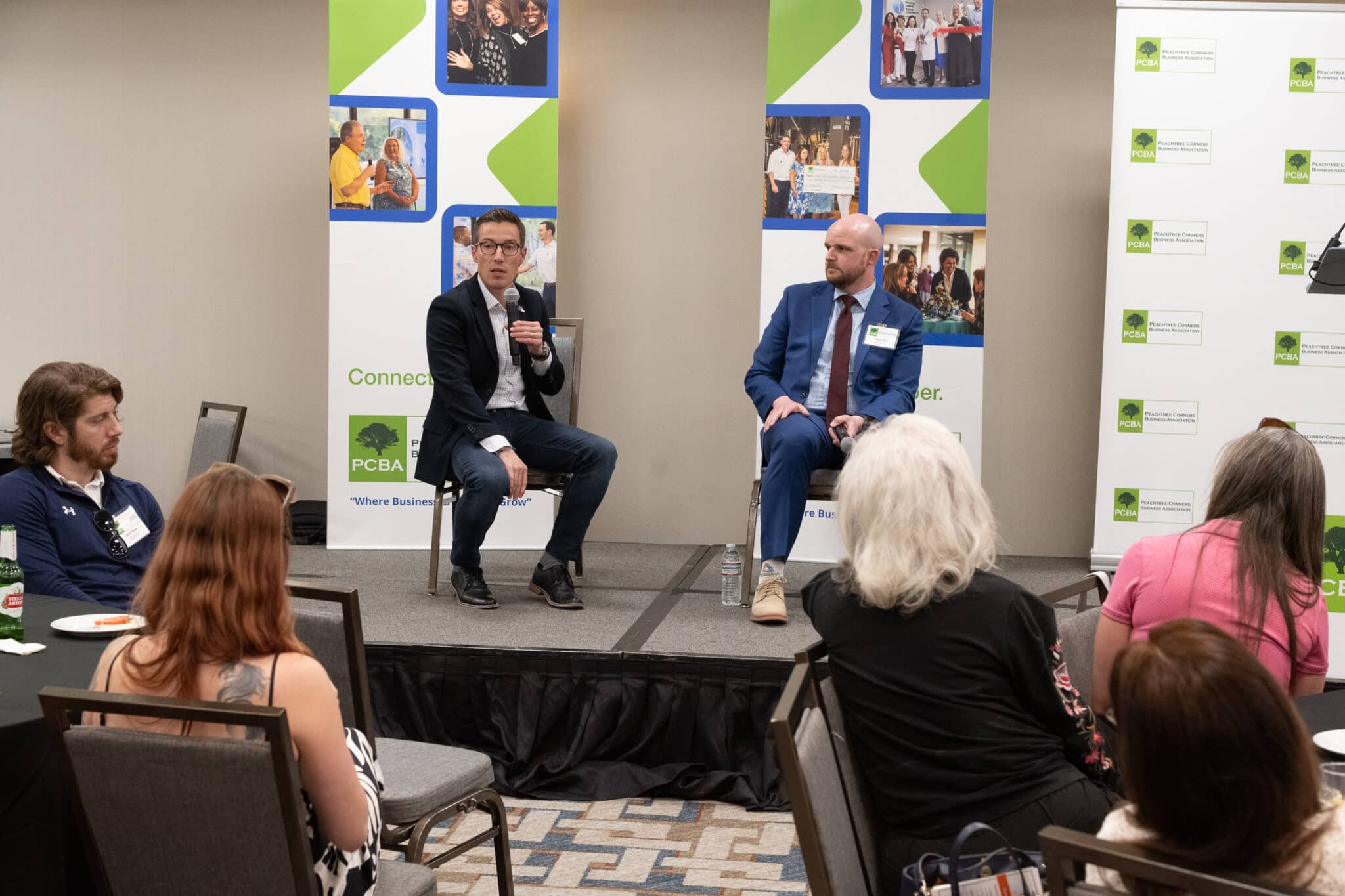
Most residents and business owners in Peachtree Corners probably think they know all about the economic development and strategic planning of Peachtree Corners, but do they really?
Peachtree Corners Business Association invited Peachtree Corners Economic Development Director Betrand Lapoire and Partnership Gwinnett Director of Economic Development Andrew Hickey to its After Hours Speaker Series on March 27 to discuss the city’s growth from a 1971 master plan to a bustling city with 42,000 inhabitants and 40,000 jobs.
Key points included the importance of business retention and expansion, with 24 projects last year creating 1,600 retained jobs, 1,600 new jobs and $250 million in new capital investment.
The Curiosity Lab, a world-class innovation center, was emphasized as a significant attraction. The city’s zoning and infrastructure plans were also discussed, focusing on balancing office and residential development to maintain a vibrant, sustainable community.
Matching jobs to residents
Although Peachtree Corners is just a teenager in terms of being an incorporated city, the foundation for this vibrant, fast-paced economic hub was laid more than 50 years ago by technology pioneer Paul Duke.
“Peachtree Corners was the first master-planned, business innovation technology park in metro Atlanta,” said Lapoire. “It was in response to the brain drain of technology with Georgia Tech graduates leaving the area.”
While the city may have a small-town feel, it’s the largest in Gwinnett County by population, but not land mass, he added.
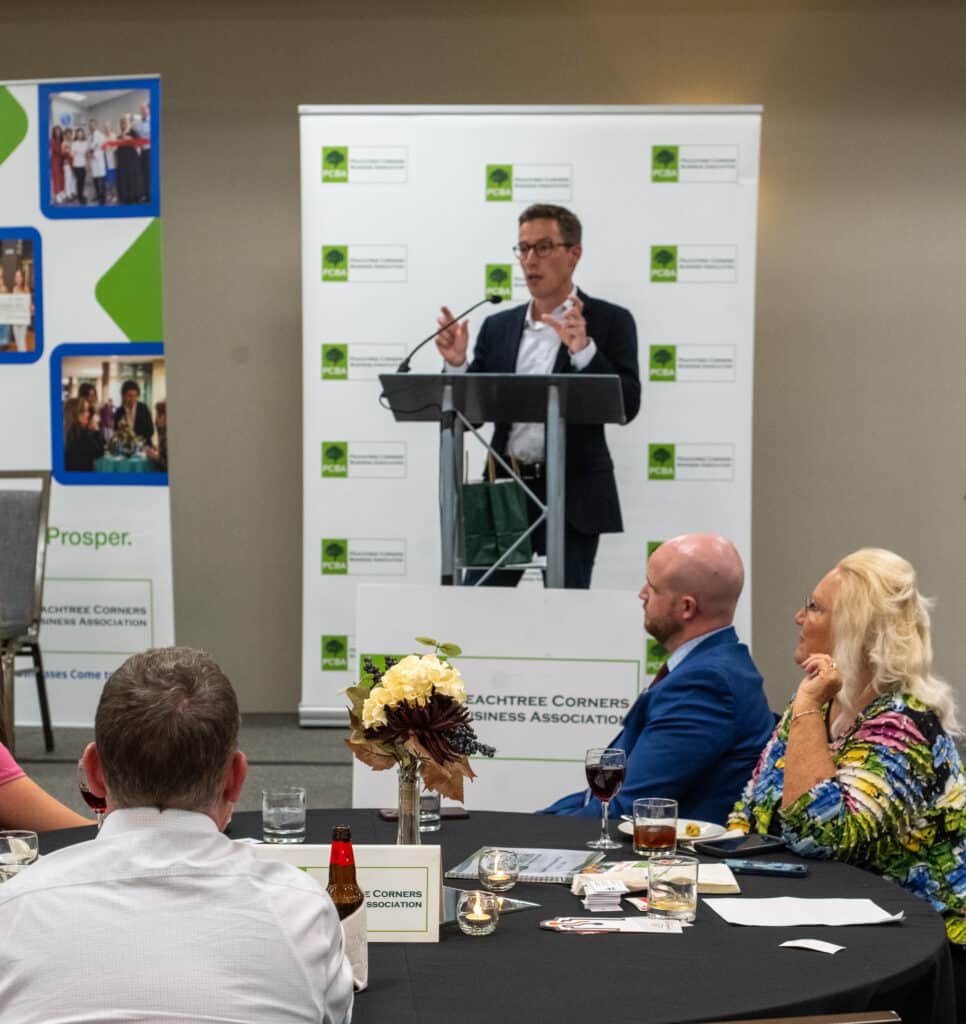
“The city started from a commercial, industrial, R&D base and then was expanded around it,” said Lapoire.
Though home to more than 42,000 residents, most of the jobs in Peachtree Corners are filled by people who live outside the city, he added.
“So we have this interesting mismatch, in a way, although not unusual,” said LaPoire. That creates traffic and transit issues. So that means that one of the solutions is to create more jobs here to fit the profile of the community.”
He presented charts that show professional services, consulting and engineering as the largest job categories. The next tier of businesses are wholesale and manufacturing.
“So we have a good mix of industry,” he said.
A five-year plan
The city has a five-year economic development plan (2023-2028) that outlines strategies for attracting and retaining businesses, with education and workforce development being key components.
Partnership Gwinnett has similar goals as Peachtree Corners, but on a larger scale.
“We are the county’s sales and marketing arm for all 17 cities now, and we receive funding from both municipal sources as well as existing businesses here — both in Gwinnett and outside of Gwinnett as well,” said Hickey.
He shared how Partnership Gwinnett is designed to drive a lot of major corporations toward doing business inside and with Gwinnett County.
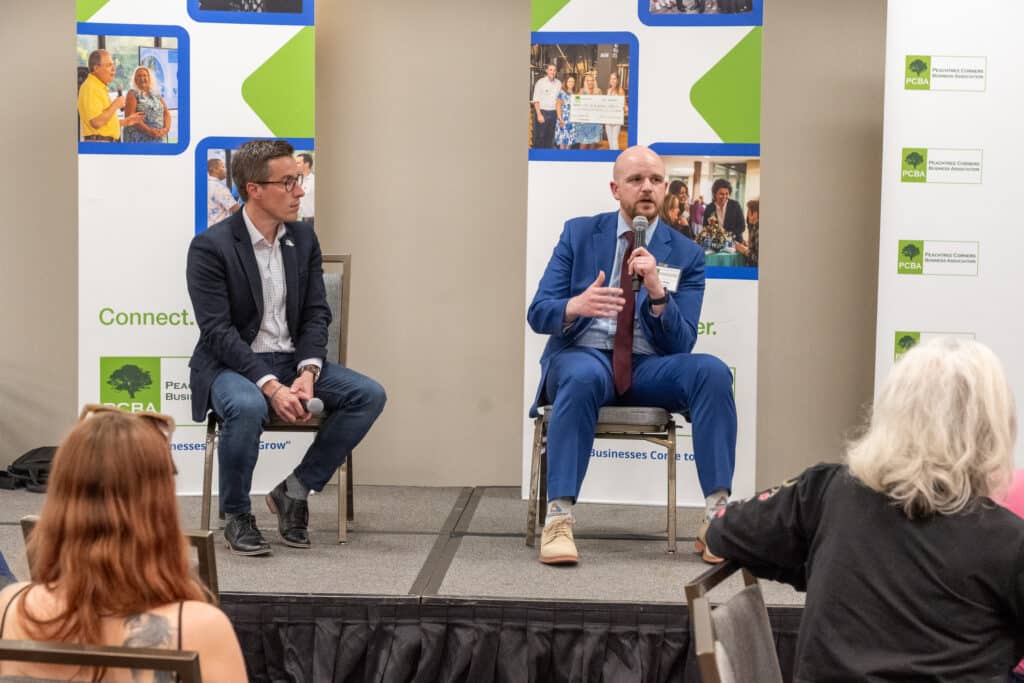
“One of the biggest things that we talk about that I’m sure it seems like most of us here, if you live here, you work here, you understand it. It’s the diversity that exists here in Gwinnett,” he said. “With a diversity index of 85, that means if we walk out of the Hilton here and we say hello to somebody, there’s an 85% chance they’re from a different ethnic or cultural background than ourselves, which to you and I may seem normal because that’s the life that we live in.”
He added that for companies, there’s a tremendous value in that, whether they have stated values, or they’re just making hiring decisions to get a wide range of candidates to fill those roles. Additionally, because of the proximity to Atlanta, Gwinnett County has a great labor draw.
Partnership Gwinnett
Partnership Gwinnett plays a significant role in recruiting businesses, expanding existing companies and developing the workforce. Hickey showed how the organization was involved with more than 24 projects last year.
“A majority of those were expansions, and that is a common thread you’ll see in economic development,” he said. “In business retention, expansion is so vital to working with our existing companies to make sure that they have the resources they need.”
He added that’s what leads to new investment and job creation in the community.
The organization also focuses on redevelopment projects, working with cities and the county to improve infrastructure and community amenities — especially strong educational institutions such Georgia Gwinnett College, Philadelphia College of Osteopathic Medicine and others.
Quality of life
In closing, both men stressed the importance of recruiting companies and developing the workforce, along with one aspect that means a lot but may not be as obvious — quality of life.
“It’s definitely evident that people like to work where they live — the whole live, work play experience,” said Hickey. “I joke that the part that people really have the most questions about, and are most excited to learn about, is new events at The Forum or Gwinnett Place Mall.”
Although they want to know what’s the next major company coming to Gwinnett, people REALLY want to know about how to spend their leisure time.
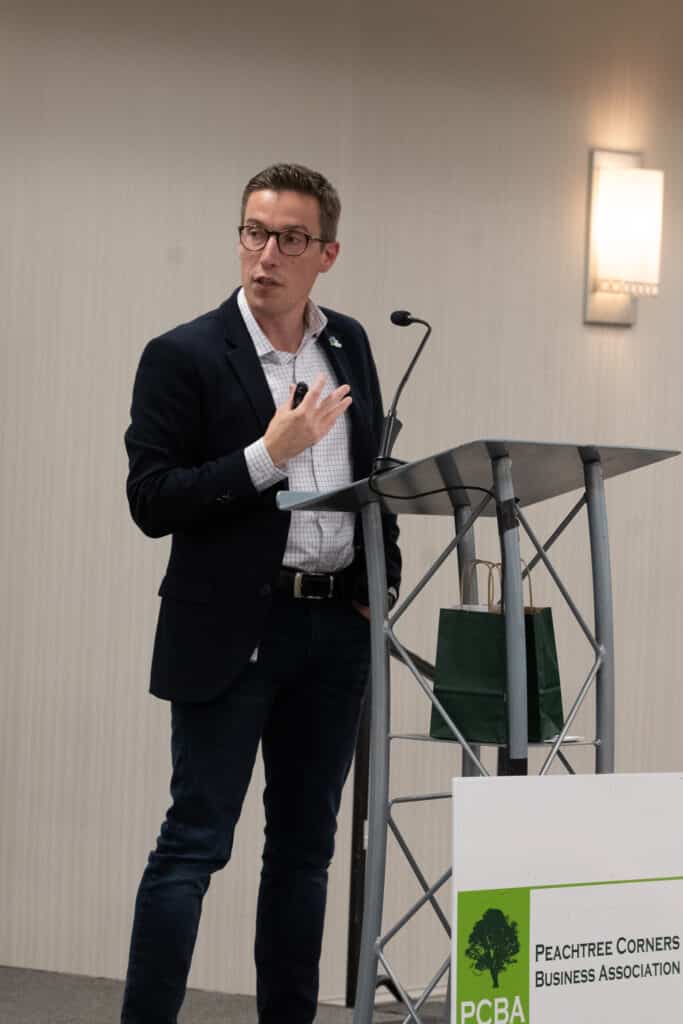
“That speaks to the importance of ensuring that we have a great community,” he said. “So at Partnership Gwinnett we work with all of our cities, and the county government as well, [on] a kind of a best-practices trip.”
He added that the peer tour allows everyone to know what the neighboring communities are doing and share the good news.
“We will take all of these elected officials, but also city staff, to different cities across the Southeast,” he said. “Last year, I believe they went to Huntsville, and have been to Greenville, Chattanooga — all cities that have done some really cool redevelopments that have taken their city to the next level. Our goal is to learn from them.”
Related
Business
Two Peachtree Corners Business Leaders Named Finalists for EY Entrepreneur Award
Published
3 weeks agoon
April 23, 2025
Ernst & Young’s Entrepreneur Of The Year celebrates ambitious entrepreneurs who are shaping the future
Ernst & Young LLP (EY US) recently announced the finalists for the prestigious Entrepreneur Of The Year 2025 Southeast Award, and two local, Peachtree Corners business leaders — David Quirk, president and CEO of DLB Associates Consulting Engineers PC and Erin Hanson, founder and CEO of Guardian Sports — made the list.
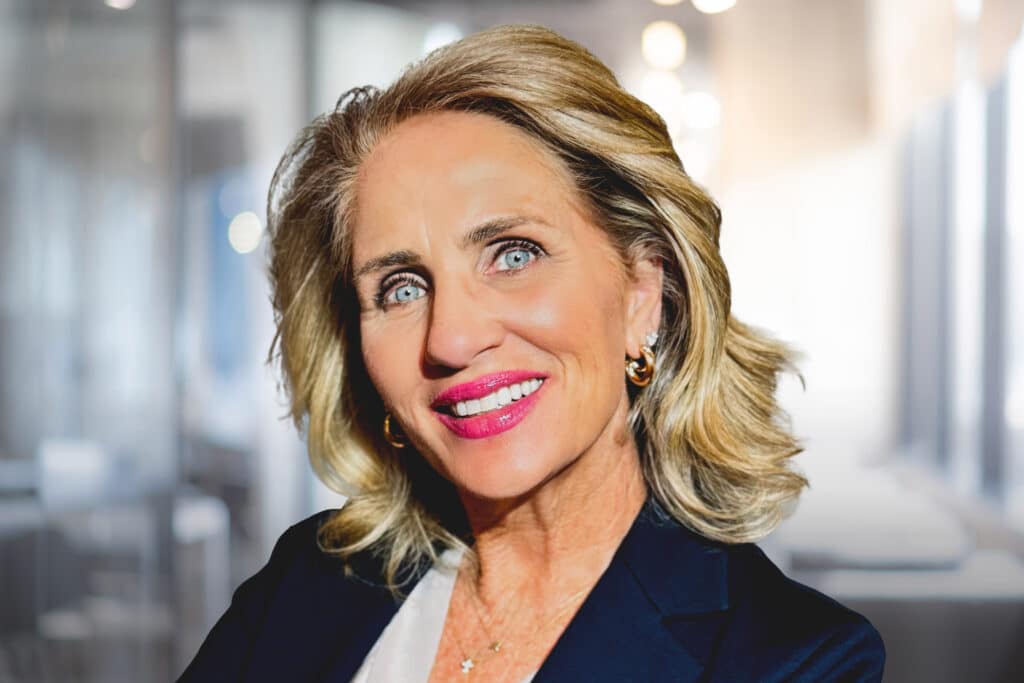
Hanson’s Guardian Sports is a family-owned company dedicated to serving athletes through safety and performance improvements in sports equipment. Major products include the Guardian Cap, PEARL ball and Guardian Infill serving the sports industry.
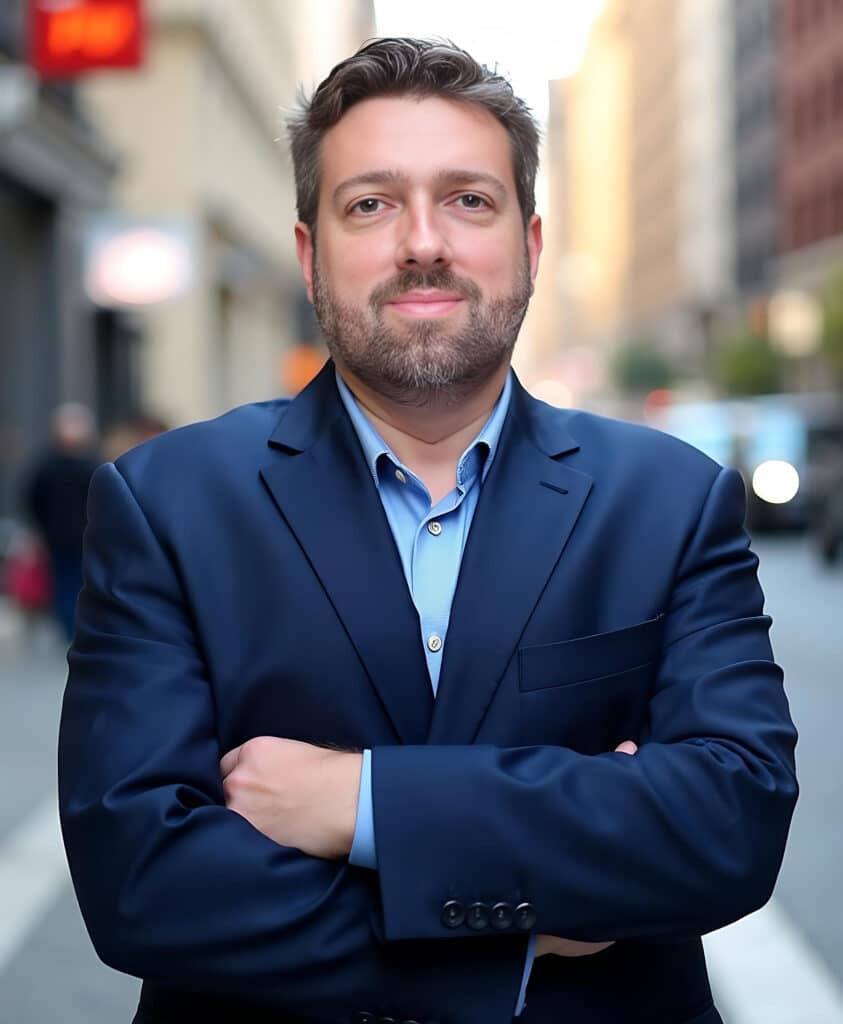
DLB Associates is a U.S.-based consulting engineering firm specializing in mission-critical and complex built environments. With more than 40 years of expertise, DLB delivers innovative, technology-driven solutions in engineering, commissioning and operations worldwide.
Celebrating entrepreneurial leaders
Now in its 40th year, Entrepreneur Of The Year recognizes the bold leaders who disrupt markets through the world’s most ground-breaking companies, revolutionizing industries and making a profound impact on communities. The program honors those entrepreneurs whose innovations shape the future and pave the way for a thriving economy and a hopeful tomorrow.
The Southeast program celebrates entrepreneurs from Alabama, Georgia, North Carolina, South Carolina and Tennessee.
An independent panel of judges selected 36 finalists for their entrepreneurial spirit, purpose, growth and lasting impact in building long-term value.
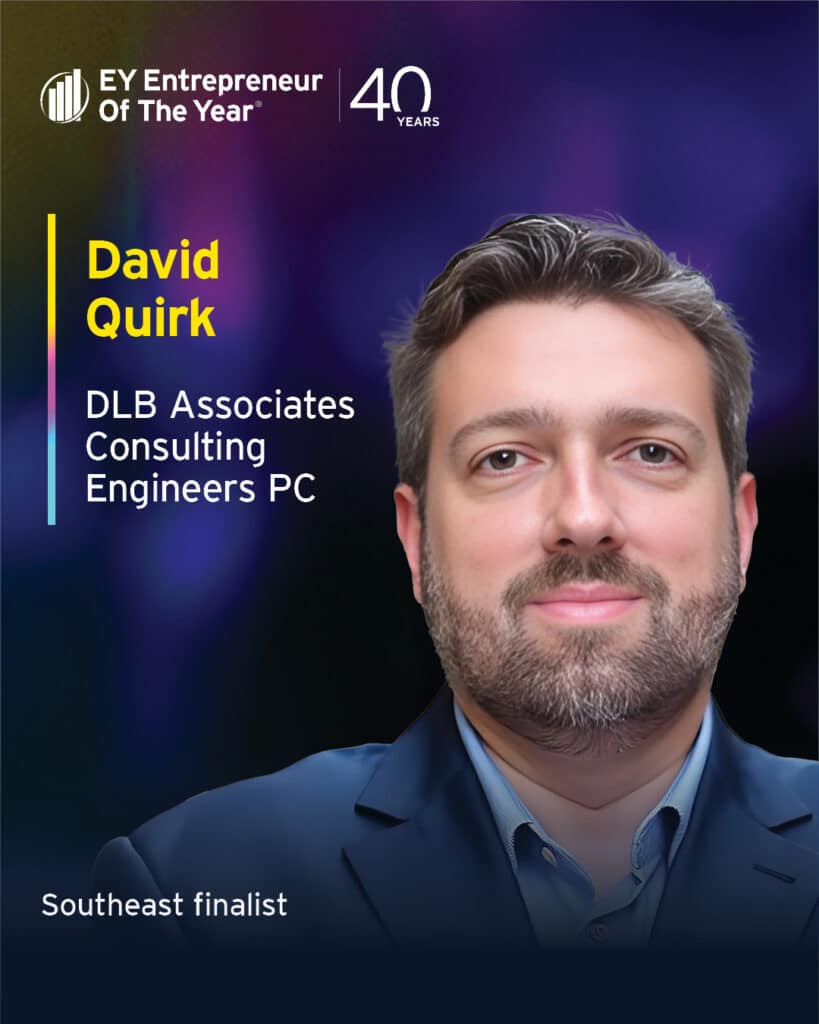
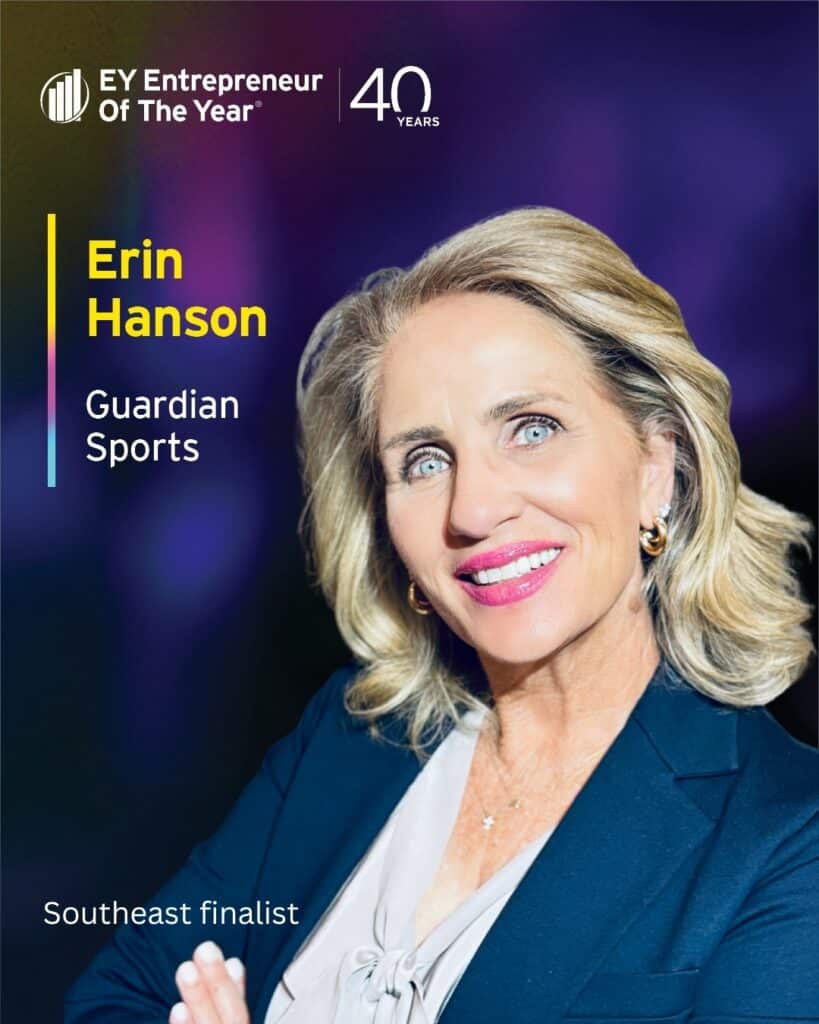
“This year’s finalists are leading examples of innovation, perseverance and resilience, illuminating paths to a brighter future for their industries and communities,” said Chevy Arnold, Entrepreneur Of The Year Southeast Program co-director.
“Their commitment to excellence transforms challenges into opportunities, inspiring us all,” added Kimberly Kicklighter, Entrepreneur Of The Year Southeast Program co-director.
Entrepreneur Of The Year honors many different types of business leaders for their ingenuity, courage and entrepreneurial spirit.
The program showcases original founders who bootstrapped their business from inception or who raised outside capital to grow their company; transformational CEOs who infused innovation into an existing organization to catapult its trajectory; and multigenerational family business leaders who reimagined a legacy business model to strengthen it for the future.
Including Quirk and Hanson, the 2025 Southeast finalists are:
- Marc Hodulich | 29029 | Atlanta, Georgia
- Damon Stafford | Alpine Intel | Charlotte, North Carolina
- Lou Hensley | Aspida | Durham, North Carolina
- Matthew Dent | Buffalo Rock Company | Birmingham, Alabama
- Melanie Little | Colonial Pipeline Company | Alpharetta, Georgia
- Will Bartholomew | D1 Training | Franklin, Tennessee
- Rene Diaz | Diaz Foods | Atlanta, Georgia
- David Quirk | DLB Associates Consulting Engineers PC | Peachtree Corners, Georgia
- Markus Scott | EyeQ Monitoring | Atlanta, Georgia
- Jon Gosier | FilmHedge | Atlanta, Georgia
- John Fitzpatrick | Force Marketing | Atlanta, Georgia
- Dr. Barry Patel | Galt Companies | Atlanta, Georgia
- Dr. Wade Smith | Galt Companies | Atlanta, Georgia
- Charles Gillespie | Gambling.com Group | Charlotte, North Carolina
- Kevin McCrystle | Gambling.com Group | Charlotte, North Carolina
- Mike Griffin | Griffin Brothers Companies | Cornelius, North Carolina
- Erin Hanson | Guardian Sports | Peachtree Corners, Georgia
- Dan Beem | Hissho Sushi | Charlotte, North Carolina
- Aaron Siegel | Home Team BBQ | Charleston, South Carolina
- Marc Murphy | Ignite Digital Services | Charleston, South Carolina
- Miller Chalk | Inglett & Stubbs, LLC | Mableton, Georgia
- Liza Rodewald | Instant Teams | Southern Pines, North Carolina
- Stephen Andresen | McClancy Foods & Flavors | Fort Mill, South Carolina
- Travis LeFever | Mission Mobile Medical Group | Greensboro, North Carolina
- Cyrus Mojdehi | Northway Homes | Charlotte, North Carolina
- Connor Ryan | NutraSky | Alpharetta, Georgia
- Fritz Owens | OTR Solutions | Roswell, Georgia
- Christopher Chuang | Relay, Inc. | Raleigh, North Carolina
- Kurt Jacobus | restor3d, Inc. | Durham, North Carolina
- Tom Kendrot | Shearwater Health | Nashville, Tennessee
- Teak Shore | Southern Lighting Source | Cumberland, Georgia
- Cindy Eckert | Sprout Pharmaceuticals | Raleigh, North Carolina
- Bryan Moore | TalkShopLive Inc. | Nashville, Tennessee
- Tina Moore | TalkShopLive Inc. | Nashville, Tennessee
- Igor Marinelli | Tractian | Atlanta, Georgia
- Joan Butters | Xsolis | Franklin, Tennessee
You can learn more about the finalists at ey.com/en_us/entrepreneur-of-the-year-us/southeast/winners-finalists.
Regional award winners will be announced on June 25 during a special celebration. The winners will then be considered by the national independent panel of judges for the Entrepreneur Of The Year National Awards, which will be presented in November at the annual Strategic Growth Forum®, one of the nation’s most prestigious gatherings of high-growth, market-leading companies.
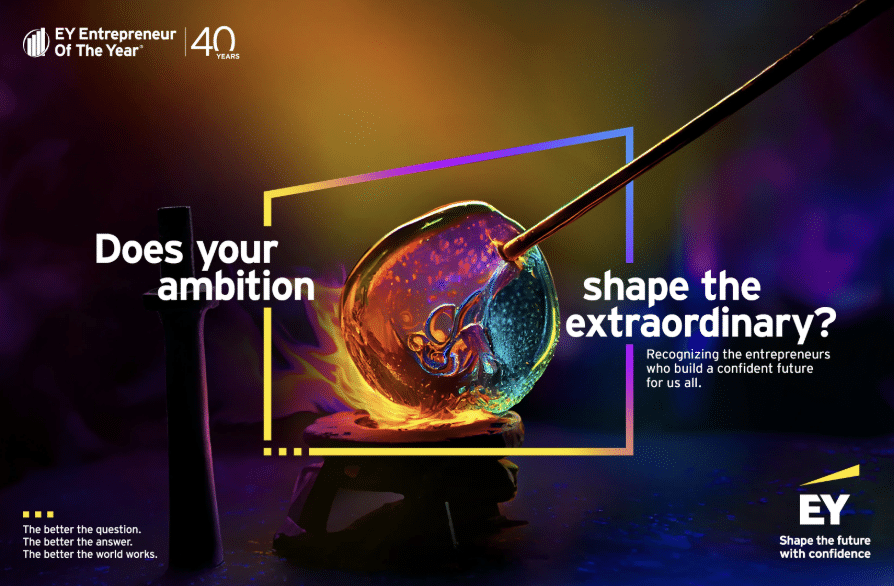
About Entrepreneur Of The Year
Founded in 1986, Entrepreneur Of The Year has celebrated more than 11,000 ambitious visionaries who are leading successful, dynamic businesses in the U.S., and it has since expanded to nearly 60 countries globally.
The U.S. program consists of 17 regional programs whose panels of independent judges select the regional award winners every June. Those winners compete for national recognition at the Strategic Growth Forum® in November where national finalists and award winners are announced.
The overall national winner represents the U.S. at the EY World Entrepreneur Of The Year™ competition.
For more about the award, visit ey.com/us/eoy.
Related
Business
SCB Construction Group Partners with CGA Reps on New Peachtree Corners HQ
Published
1 month agoon
April 15, 2025
SCB Construction Group, freshly rebranded from SteelCo, secures construction project with CGA Reps for new office HQ in Peachtree Corners
SCB Construction Group has announced a strategic partnership with CGA Reps to build a new office headquarters in Peachtree Corners. The project, encompassing approximately 26,000 square feet of innovative workspace, marks a significant milestone in advancing CGA Reps’ corporate vision while showcasing SBA Construction Group’s commitment to delivering transformative construction solutions.
In collaboration with Oakley Real Estate Partners — serving as developers of the project on behalf of CGA Reps — this venture reflects a united effort to bring cutting-edge design (from Smallwood architecture firm) and operational excellence to the commercial kitchen equipment industry.
The announcement follows several high-profile projects for SCB Construction Group in 2024, including a 72,500-square-foot manufacturing center and headquarters for Process Equipment & Controls, an impressive interior build-out for Courtesy Ford Conyers’ commercial service center and the Phase 1 completion for StoreEase Loganville — recently honored as a 2024 Smart Facility of the Year by Modern Storage Media.
A bold new chapter for CGA Reps
The new 25,890-square-foot headquarters is designed to be more than just a workplace — it is envisioned as an inspiring environment that serves both client engagements and employee creativity. CGA Reps is recognized as an industry expert in commercial kitchen equipment, representing leading manufacturers, warehousing, distributing and installing everything from fryers to commercial walk-in freezers.
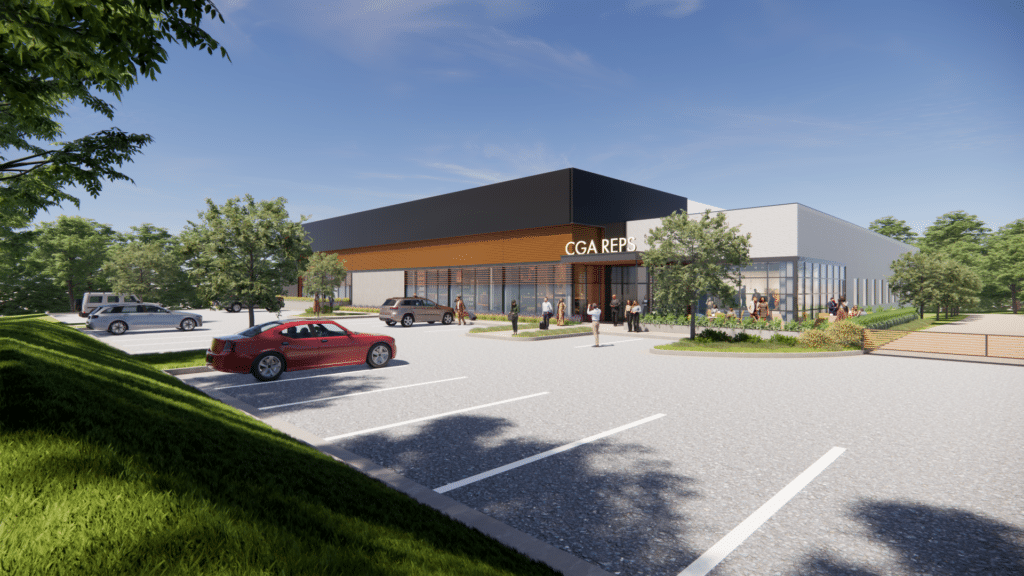
The facility’s design reflects this expertise, featuring a dedicated approximately 9,000-square-foot showroom kitchen that will host equipment demonstrations, tradeshows and webinars. This dynamic space will allow CGA Reps to showcase its comprehensive product range and provide clients with hands-on experiences of the latest commercial kitchen innovations.
A standout feature of the project is its innovative approach to stormwater management. With the site comprising only three acres, sufficient space for a traditional detention pond does not exist. To overcome this challenge, the design includes an underground detention system located beneath the truck court to efficiently handle all stormwater runoff.
This solution not only maximizes the use of the available land but also reinforces CGA Reps’ commitment to sustainable practices.
“We are excited to embark on this project with CGA Reps,” said Jay Bailey, CEO of SCB Construction Group. “This partnership underscores our commitment to customer excellence in design and construction, and it is a testament to the trust our clients place in our ability to deliver projects that not only meet but exceed expectations.”
Delivering excellence through proven expertise
SCB Construction Group’s track record in 2024 has been nothing short of remarkable. Earlier in the year, the company completed a 72,500 square foot manufacturing center for Process Equipment & Controls, integrating office space within a dynamic production facility.
This project was celebrated for its innovative design that balanced operational efficiency with a modern aesthetic, utilizing IMP panels to mimic tilt-up concrete, setting new standards for manufacturing environments.
Similarly, the interior build-out for Courtesy Ford Conyers’ commercial service center demonstrated SCB Construction Group’s ability to transform conventional spaces into functional and attractive environments that cater to both customer and staff needs.
The company’s commitment to quality and precision was again evident in the successful Phase 1 completion for StoreEase Loganville. This project, which recently earned the distinction of a 2024 Smart Facility of the Year by Modern Storage Media, highlights SCB Construction Group’s forward-thinking approach to construction and design, incorporating smart technologies and design that enhance sustainability and operational efficiency.
A rebranding that reflects a vision for the future
In a move that signals its evolution and growth, SCB Construction Group has recently rebranded from its former identity, SteelCo Buildings, as it spins off its construction division. This strategic rebranding is not merely cosmetic — it represents a renewed commitment to capabilities, credibility and client-focused service.
The refreshed brand is anchored by a new tagline “Deep Expertise, High Expectations” and a clear brand promise that communicates the company’s mission: to craft exceptional construction experiences based on precision, innovation and trust.
“Our rebranding is about more than just a new name or logo; it’s a renewed promise to our clients and communities,” explained Robert Lee, marketing director at SCB Construction Group. “We believe that our updated brand identity, including our invigorated tagline and mission statement, encapsulates our dedication to pushing the boundaries of design and construction. It reflects our commitment to creating spaces that are as inspiring as they are functional.”
Transforming spaces to inspire and connect
The new headquarters for CGA Reps is expected to become a landmark facility in Peachtree Corners. Beyond its impressive architectural design and advanced construction techniques, the building is planned as a hub for innovation and collaboration.
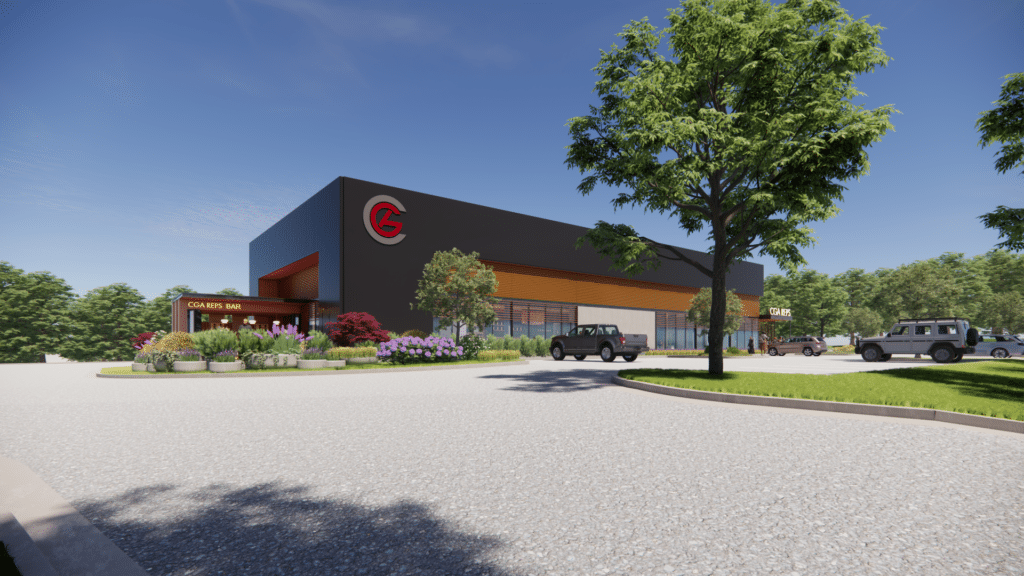
The interior build-out will include dynamic client reception areas, interactive meeting rooms, and dedicated spaces designed to foster creativity and teamwork among employees. The layout is crafted to ensure that every area of the facility contributes to a productive and inspiring work environment.
“By investing in this state-of-the-art facility, CGA Reps is making a strong statement about the future of work,” said Bryan Young, VP of construction at SCB Construction Group. “Our team is dedicated to designing and building spaces that not only serve the immediate needs of our clients but also create environments that motivate and inspire. The new headquarters will be a testament to that vision.”
Looking ahead
The partnership between SCB Construction Group and CGA Reps marks a significant step forward for both companies. As SCB Construction Group continues to build on its legacy of excellence and innovation, this project is poised to set a new benchmark for modern office headquarters design in the region.
With a strategic focus on creating spaces that inspire, connect and drive success, the future looks promising for both SCB Construction Group and its esteemed partner, CGA Reps.
For more information on the new headquarters project or to learn more about SCB Construction Group’s portfolio, visit scbcg.com.
Related
Read the Digital Edition
Subscribe
Keep Up With Peachtree Corners News
Join our mailing list to receive the latest news and updates from our team.
You have Successfully Subscribed!

Digital Edition

Official City Merchandise Line Debuts This Saturday at Town Green

Paul Duke STEM High School Student Earns CGO Scholarship

World Blood Donor Day Starts Here: Theo’s Miracle, Katherine’s Mission [Podcast]

Executive Function: A Tribute to Working Moms

Peachtree Corners Grows Business Opportunities Through Economic Development

Peachtree Corners Hosts Discussion About the Future of Local Policing

Simpson Elementary Marks Exceptional Children’s Week

Atlanta’s Dog Howl-O-Ween Festival Moving to Peachtree Corners for 2025

D1 Training Brings New Fitness Concept to Peachtree Corners

Peachtree Corners Hosts Discussion About the Future of Local Policing

City of Peachtree Corners Awarded Certificate of Achievement From GFOA for Seventh Straight Year

Simpson Elementary Marks Exceptional Children’s Week

Executive Function: A Tribute to Working Moms

Official City Merchandise Line Debuts This Saturday at Town Green

Peachtree Corners Grows Business Opportunities Through Economic Development

Light up the Corners [Video]

Capitalist Sage: Business Leadership in Your Community [Podcast]

Cliff Bramble: A Culinary Adventure through Italy

Top 10 Brunch Places in Gwinnett County

A Hunger for Hospitality

THE CORNERS EPISODE 3 – BLAXICAN PART 1

Top 10 Indoor Things To Do This Winter

The ED Hour: What it takes to Remove Barriers from Education







